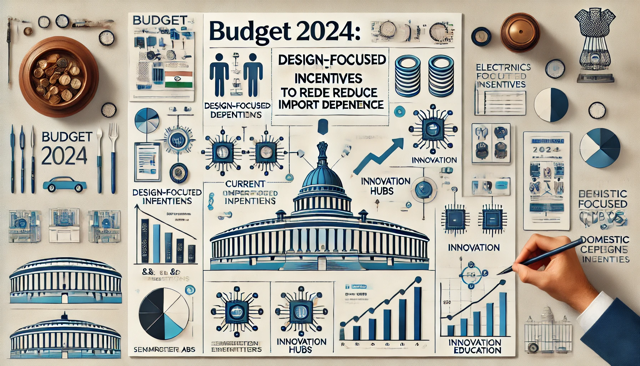Budget 2024: Electronics Sector Urges for Design-Focused Incentives to Reduce Import Dependence
Published: 7.23.2024
As India eagerly awaits the announcement of Budget 2024, the electronics sector is advocating for policies that emphasize innovation and diminish the country’s heavy reliance on imported components. Industry leaders are pushing for design-focused incentives and robust measures to enhance domestic manufacturing capabilities. These steps are crucial for addressing supply chain vulnerabilities and positioning India as a global leader in electronics.

India's electronics market is among the fastest-growing globally, driven by soaring demand for consumer electronics, smartphones, and smart devices. Despite this impressive growth, the sector remains heavily dependent on imports for critical components such as semiconductors, printed circuit boards (PCBs), and other essential hardware. This reliance was starkly highlighted during the COVID-19 pandemic, which caused global supply chain disruptions and led to significant shortages.
A primary request from the electronics industry is the introduction of design-focused incentives in Budget 2024. Such incentives would encourage local companies to invest in research and development (R&D), fostering innovation and reducing dependence on foreign technology. Enhancing domestic design capabilities would enable India to climb the value chain and become a formidable player in the global electronics market.
Design-focused incentives are expected to spur the creation of homegrown intellectual property (IP) and enable Indian companies to develop cutting-edge products for both local and international markets. These initiatives would not only boost the competitiveness of Indian manufacturers but also attract foreign investments and foster collaborations.
The electronics sector's heavy reliance on imports significantly impacts India's economy, contributing to a substantial trade deficit. For Budget 2024, stakeholders are urging the government to implement policies that promote self-reliance and reduce import dependence. Increasing funds allocated to R&D within the electronics sector to drive innovation and the development of indigenous technologies is a key measure. Investing in advanced infrastructure for electronics manufacturing, including semiconductor fabrication plants and cutting-edge testing facilities, is also crucial. Strengthening education and training programs to cultivate a skilled workforce specialized in electronics design and manufacturing, as well as providing tax breaks and financial incentives to companies investing in local manufacturing and R&D activities, are vital steps.
The Indian government has launched several initiatives to boost domestic manufacturing, such as the Production Linked Incentive (PLI) scheme and the “Make in India” program. While these programs have had a positive impact, industry leaders believe that more targeted measures are needed to address the specific challenges faced by the electronics sector. For Budget 2024, the sector is optimistic about the introduction of policies that will enhance these initiatives' effectiveness. Expanding the PLI scheme to cover more segments of the electronics industry and increasing the financial incentives offered is one expectation. Implementing strategic policies to establish semiconductor fabrication plants in India, thereby reducing reliance on foreign semiconductors, is another crucial step. Additionally, developing robust supply chain networks within the country to mitigate the risks associated with global disruptions is essential.
Achieving self-reliance and reducing import dependence in the electronics sector requires a comprehensive approach that includes government support, private sector investment, and a focus on innovation and skill development. Budget 2024 presents a crucial opportunity for India to address these challenges and pave the way for sustainable growth in the electronics industry. By implementing design-focused incentives and reducing reliance on imports, India can transform its electronics sector into a global powerhouse, driving economic growth and technological advancement. The call for supportive policies in Budget 2024 is not just a plea for immediate relief but a strategic move towards building a resilient and competitive electronics manufacturing ecosystem.
In conclusion, as India anticipates the unveiling of Budget 2024, the electronics sector's demand for design-focused incentives and measures to reduce import dependence highlights the need for a forward-thinking approach. Addressing these key issues will empower the electronics industry to achieve new heights of innovation, self-reliance, and global competitiveness.


.png)

